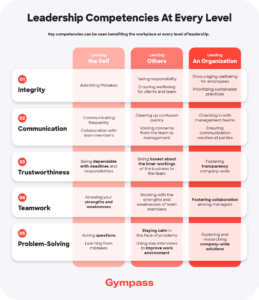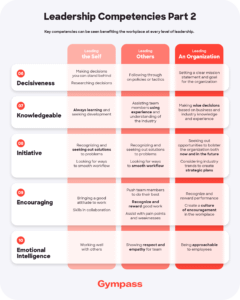10 Leadership Competencies Every Professional Should Know
Last Updated Jan 28, 2025

If you ever played “follow the leader” as a kid, you were really getting insight into one of the truths of the world: Leadership matters. Companies are becoming more and more aware of just how important leadership is to successful companies. In fact, one of the top priorities for HR in 2023 is creating diverse and strong leadership. People want great leadership.
But there’s also an unfortunate gap for many companies. Seventy-seven percent of businesses have a leadership gap right now where they aren’t getting enough leaders. And it’s hurting companies and employees. Beyond that, 79% of employees report planning to quit their jobs because they aren’t feeling appreciated by their leaders. Sixty-nine percent of employees feel like there aren’t enough opportunities for leadership development (hence the bad leadership that makes them want to quit). In fact, only 5% of companies have enough leadership development to grow their companies. Leadership is going to be a big focus and for good reason: it’s important and not enough is happening with it.
So how do you go about developing your leadership? How do you fill that development gap and become one of those few companies who can use leadership to grow? Well, one great starting place is leadership competencies. Leadership competencies can help you develop great leadership skills and move your company forward. We’ll walk you through 10 key leadership competencies every professional should know, so you can work toward developing your leadership skills.
What Are Leadership Competencies?
So what are leadership competencies? Essentially, leadership competencies are soft skills and attributes that make a good leader; they’re the qualities of a leader. They’re soft skills that are hard to measure, but they’re valuable skills because they help inspire your team and help you gain trust and loyalty. Leadership development and these competencies aren’t just about becoming a better leader; they’re also about becoming a better person. Leadership competencies help you in the rest of your life as well.
3 Levels of Leadership
To really get into leadership competencies, it’s important to understand leadership generally. There are three levels of leadership to consider as you move forward developing your leadership skills:
- Leading yourself. Learning how to lead yourself and to be responsible for yourself is where you can start with developing your leadership competencies. Leading yourself can include taking responsibility for your work and managing your own work.
- Leading others. Once you can lead yourself, you’re ready to lead others. This might be leading a team or running a project.
- Leading an organization. Once you are successful at leading others and inspiring trust, you can lead an organization. That’s where the CEO sits or a small business owner.
10 Key Leadership Competencies
So without further ado, let’s dive into 10 key leadership competencies that can help you develop as a leader and as a person.

- Integrity
The first of these leadership competencies is foundational for a reason. Integrity is having strong moral principles and staying true to them in all situations. It’s about honesty and following through with your commitments. What does integrity look like at work? Integrity at work can be about upholding your own personal values and your organization’s values. Here are a few other key aspects of integrity as a leader in your workplace:
- Admitting mistakes
- Taking responsibility for a poor decision
- Ensuring the wellbeing of clients and their team
When you have integrity, you are responsible for your actions and your team’s, and you look out for your team and your clients.
- Communication
Eighty-six percent of employees consider poor communication one of the main reasons for workplace failures. So communication matters, and a great leader knows how to communicate. Communicating well can boost your team’s productivity by 25%. Solid leaders show communication skills by
- Communicating frequently
- Recognizing and clearing up confusion quickly
- Voicing concerns from the team to higher up management
- Listening to their team members
Communication is the foundation of relationships, and leaders cultivate relationships with their team members by communicating well. That’s why we think communication is one of the most important leadership competencies.
- Trustworthiness
A lack of trustworthiness can literally create a “sick and dysfunctional” workplace. Yeah, you don’t want that, and we don’t want that either. That’s why trustworthy leaders matter so much and why it’s an important addition to these leadership competencies. They can really boost that workplace culture and create strong relationships with team members. Leadership and employee relations founded on trust are stronger.
As a leader, trustworthiness at work can look like:
- Being dependable with deadlines and responsibilities
- Meeting all deadlines
- Keeping promises to the team
- Being honest about the inner workings of the business to their team
- Being transparent
- Teamwork
A lack of teamwork means losing out on employee productivity, innovation, talent retention and more. Leaders should remember that they are part of the team they’re leading. Think about it this way: the head is still a part of the body and needs to work with all the rest of the body parts. That’s why teamwork is part of our key leadership competencies: it helps to remember to be a part of a team. Teamwork could look like:
- Knowing your strengths and weaknesses
- Knowing the strengths and weaknesses of your team members
- Highlighting everybody’s strengths
- Finding ways to solve weaknesses
Ultimately, a leader will build their team and work with their team members to achieve more than any of them could individually.
- Problem-Solving
Problems arise in any workplace. It’s just a fact of life. A good leader is ready to tackle problems and lead their team through the fray. Problem-solving as a leader in the workplace could look like:
- Conflict management (conflict can be a problem, after all)
- Asking questions and being curious, so you can find what’s happening
- Learning from mistakes and problems you’ve already solved
- Staying calm in the face of problems
- Using “stay interviews” to work with employees
Leadership competencies are all about building and growing, and learning more about how to problem solve can help you be in a position to grow your organization.

- Decisiveness
A wishy-washy leader doesn’t do anyone any good. If the leader can’t even stand behind a decision, why should anyone on the team or at the company? Being able to make good decisions is a key competency for a leader. Here are some tips for being decisive as a leader:
- Make decisions you can stand behind
- Research your decisions, so you can be confident
- Don’t go back-and-forth while making a decision (or you’ll look indecisive)
- Don’t immediately change your decision after you’ve made it
- Be confident
- Be accountable
Being confident is a part of a lot of these leadership competencies, but it goes far when paired with decisiveness.
- Knowledgeable
Leadership competencies aren’t always about what you do. Sometimes it’s about what you know. Leaders are leaders for a reason: they know their stuff. Making sure you’re an expert in your field and an expert in leadership is a great way to be knowledgeable and develop your leadership competencies. Know your industry, and be able to impart that knowledge to your team members. Leaders can be teachers or models for the rest of their team members, so knowing your stuff matters.
- Initiative
The early bird gets the worm because the early bird is the one that shows initiative. Instead of waiting for prime opportunities to pass them by, leaders with initiative seize opportunities early on and seek them out. Having initiative as a leader could look like:
- Seeking out problems before they rise to the surface
- Volunteering to shoulder loads or fill positions as needed
- Being detail-oriented
- Being goal-oriented
You’re already doing a great job with initiative by learning about leadership competencies. You’re already taking initiative by developing leadership competencies, so you’re off to a great start!
- Encouraging
A leader isn’t just about managing yourself; it’s also about leading other people. A great way to be a true leader is to encourage others and encourage your team as you go. Fifty-two percent of workers are feeling burned out, so your team could use encouragement to keep going. Facing burnout with empathy can help you support your team the way they need to be supported. Employees need to be recognized for their hard work. Sixty-nine percent of employees say they would work harder if they were recognized for their work, and providing encouragement is a great way to do that. Here are some other encouragement tips:
- Pushing your team members to do their best
- Providing development opportunities
- Providing opportunities to let team members show their expertise
- Reward good work whenever you see it
- Use failures as a learning opportunity instead of punishment
Being encouraging can help you be a true leader and help you better keep your team together—a key part of leadership competencies.
- Emotional Intelligence
Some might say that emotional intelligence or EQ is actually more important than your IQ. Being emotionally astute with your team members is a great way to build relationships—both with your team members on the job and with employees returning to the workplace. Having emotional intelligence as a leader can mean being:
- Empathetic and understanding
- Patient
- Approachable
- Treats team members as people
- Fair
- Authentic
Kindness and understanding goes a long way as a leader, which is why this might be the last of the listed leadership competencies but certainly not the least important.
The Bottom Line
At the end of the day, mastering these leadership competencies is a great way to develop as a leader and as an individual. Being able to face challenges, work through problems, jump on opportunities, and treat people kindness can all help move you forward and grow your organization.
Leadership competencies and development is just the beginning for caring for your employees and providing for their wellbeing. With great leadership in place, you have the opportunity to build a workplace that draws talent right to you. A necessity for that is a great benefits package. Luckily, this development from leadership to benefits isn’t something that you have to figure out alone. Talk to a Wellbeing Specialist today to get started!
References
- https://www.gartner.com/en/human-resources/trends/top-priorities-for-hr-leaders
- https://leaders.com/articles/leadership/why-is-leadership-important/
- https://goremotely.net/blog/leadership-statistics/
- https://goremotely.net/blog/leadership-statistics/
- https://goremotely.net/blog/leadership-statistics/
- https://www.aihr.com/blog/leadership-competencies/
- https://www.betterup.com/blog/integrity-in-the-workplace
- https://pumble.com/learn/communication/communication-statistics/
- https://pumble.com/learn/communication/communication-statistics/
- https://www.forbes.com/sites/forbescoachescouncil/2019/10/24/lack-of-trust-can-make-workplaces-sick-and-dysfunctional/?sh=79c73dd644d1
- https://www.kent.edu/yourtrainingpartner/what-do-you-lose-when-teamwork-fails
- https://everyonesocial.com/blog/employee-burnout-statistics/
- https://haiilo.com/blog/employee-engagement-8-statistics-you-need-to-know/
- https://owlcation.com/social-sciences/Why-Emotional-Intelligence-is-More-Important-Than-IQ
Category
Share

The Wellhub Editorial Team empowers HR leaders to support worker wellbeing. Our original research, trend analyses, and helpful how-tos provide the tools they need to improve workforce wellness in today's fast-shifting professional landscape.
Subscribe
Our weekly newsletter is your source of education and inspiration to help you create a corporate wellness program that actually matters.
Subscribe
Our weekly newsletter is your source of education and inspiration to help you create a corporate wellness program that actually matters.
You May Also Like

Effective 1:1 Meetings Guide: Best Practices & Tips | Wellhub
Discover strategies for productive 1:1 meetings that foster clear communication, goal-setting, and employee development.

Leadership Development Guide | Wellhub
Explore how to implement leadership development programs with actionable strategies to boost organizational growth, talent acquisition, and business success.

9 Leadership Styles: Discover Which One Fits You | Wellhub
Explore 9 leadership styles and identify which one can help you effectively lead and empower your team with the right approach.